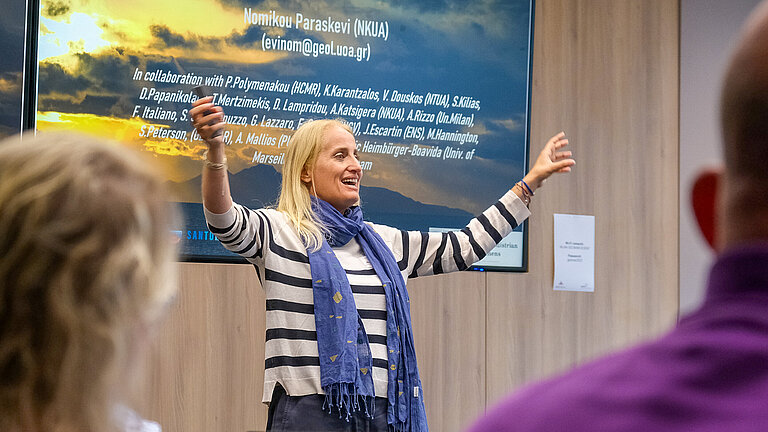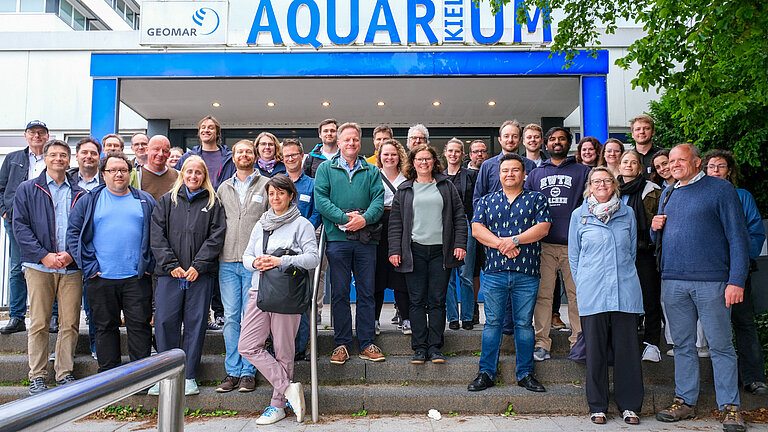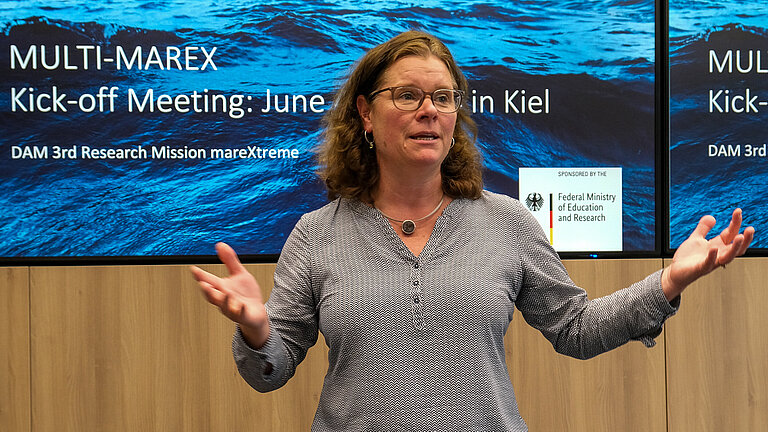Possible natural hazards in the Aegean Sea
Researchers discussed recommendations for action and measures
The Mediterranean is the most popular destination for German tourists. However, little is known about the fact that many regions of the Mediterranean are exposed to a high risk of natural disasters such as earthquakes, volcanic eruptions and tsunamis. In order to provide residents and tourists with the necessary knowledge to cope with natural disasters, the MULTI-MAREX joint project is establishing a living lab in the Mediterranean region. “What is new about our approach is the collaborative research approach together with the affected communities, known as co-design,” explains the coordinator of the joint project, Dr Heidrun Kopp, Professor of Marine Geodesy at GEOMAR. "We are working on site in a real laboratory with local authorities, mayors' offices, schools and other civil organizations. This allows us to incorporate local knowledge and historical experience into our research. This is crucial in order to be able to assess the impact on the coastal communities and to inform the population in the best possible way about protection mechanisms and involve them in the development of early warning systems."
At the kick-off meeting of MULTI-MAREX, all German and Greek partner institutions of the project came together for the first time at GEOMAR Helmholtz Center for Ocean Research Kiel. Greek and German research institutes have been working closely together in marine research for many years. “These are the best conditions to make the project a success,” says Dr Paraskevi Nomikou, Professor of Geological Oceanography at the University of Athens. Research is being conducted on the Greek island of Santorini in the Aegean Sea, among other places. Up to two million tourists, including many from Germany, visit Santorini every year. Due to its exposed location, it is repeatedly affected by natural hazards. For Germany, the scientific activities in MULTI-MAREX are not only important because of the large number of travellers to the Mediterranean, but also to transfer the research approaches to the German coasts. These are also affected by natural hazards such as storm surges and coastal erosion. “The aim of our project is to provide specific recommendations for coping with natural disasters so that both holidaymakers and local residents or authorities know how to act,” adds Kopp.
MULTI-MAREX is one of four projects of the research mission “Towards improved risk management in the area of marine extreme events and natural hazards” (mareXtreme) conducted by the German Marine Research Alliance (DAM). In the mission, around 150 researchers from 29 partner organizations are investigating how to deal with extreme marine events and natural hazards and their long-term effects on marine ecosystems and social life on the coast.
The meeting has now provided a platform for the exchange of expertise. For example, in cooperation with Dr Felix Gross, head of the “Natural Hazards of Coasts and Seas” department at the Center for Ocean and Society (CeOS) at Kiel University, a virtual application will be developed that visualizes geomarine natural hazards. The participants also discussed how knowledge and possible new technological developments can be made accessible and usable for society in conjunction with the other projects of the mareXtreme research mission.
Professor Dr Heidrun Kopp was pleased with the milestone: “The first meeting marks the beginning of an exciting journey in which we will work together to deepen our understanding of extreme marine events and natural hazards. We are looking forward to the exchange with our project partners and stakeholders in order to achieve this important goal."
Deutsche Allianz Meeresforschung:
The German Marine Research Alliance (DAM) brings together 24 leading German marine research institutions with the aim of strengthening the sustainable management of coasts, seas and the ocean through research, transfer, data management, digitalization and infrastructure. To achieve this, the DAM and its member institutions develop solution-oriented knowledge and communicate options for action in politics, business and civil society. It is funded by the federal government and the northern German states of Bremen, Hamburg, Mecklenburg-Western Pomerania, Lower Saxony and Schleswig-Holstein.
3rd DAM research mission Towards improved risk management in the area of extreme marine events and natural hazards (mareXtreme)
In the DAM research mission “Towards improved risk management of marine extreme events and natural hazards”, short title mareXtreme, around 150 scientists from 29 partner organizations are examining how to deal with the interactions between short-term multiple and cascading extreme events and natural hazards and their long-term impacts on marine ecosystems and coastal societies. The aim of mareXtreme is to significantly improve the predictive capacity of marine extreme events and natural hazards, to support the sustainable development of coastal communities and to strengthen the resilience of coastal society.

Focus on the Aegean: Professor Paraskevi Nomikou from the University of Athens presents the research work in Greece. Photo: Andrea Geipel

First meeting in Kiel: The participants of the MULTI-MAREX network meeting in front of the GEOMAR aquarium. Photo: Andrea Geipel

Professor Heidrun Kopp opens the first joint meeting of MULTI-MAREX at GEOMAR in Kiel. Photo: Andrea Geipel


